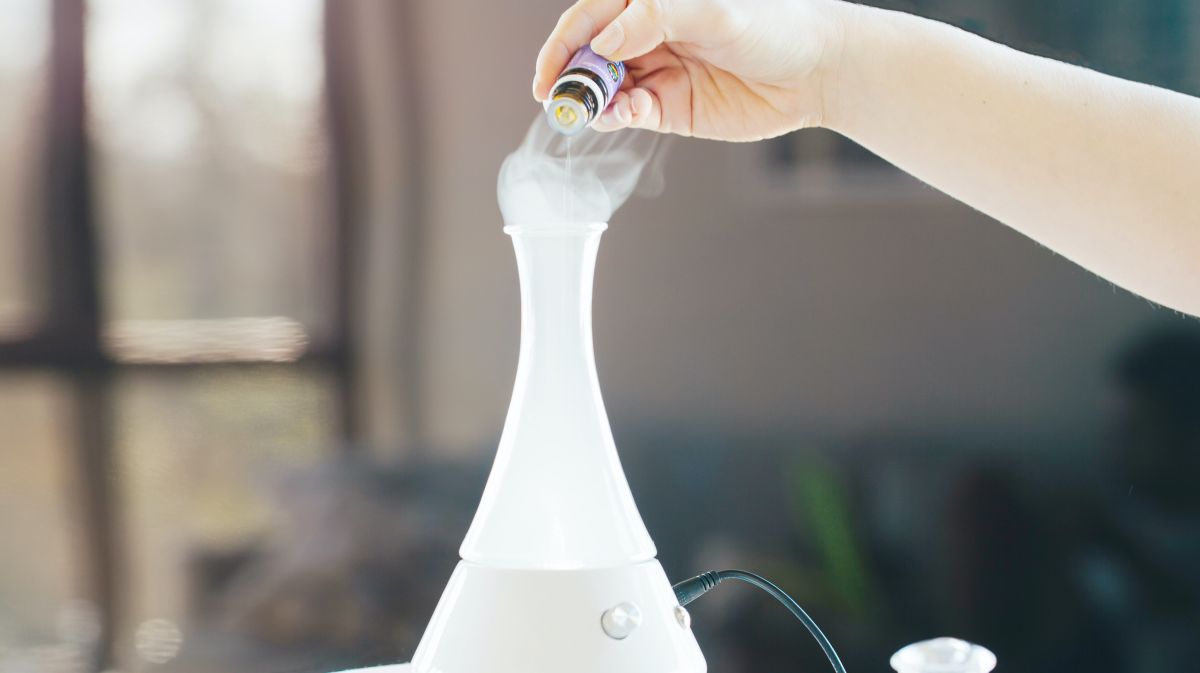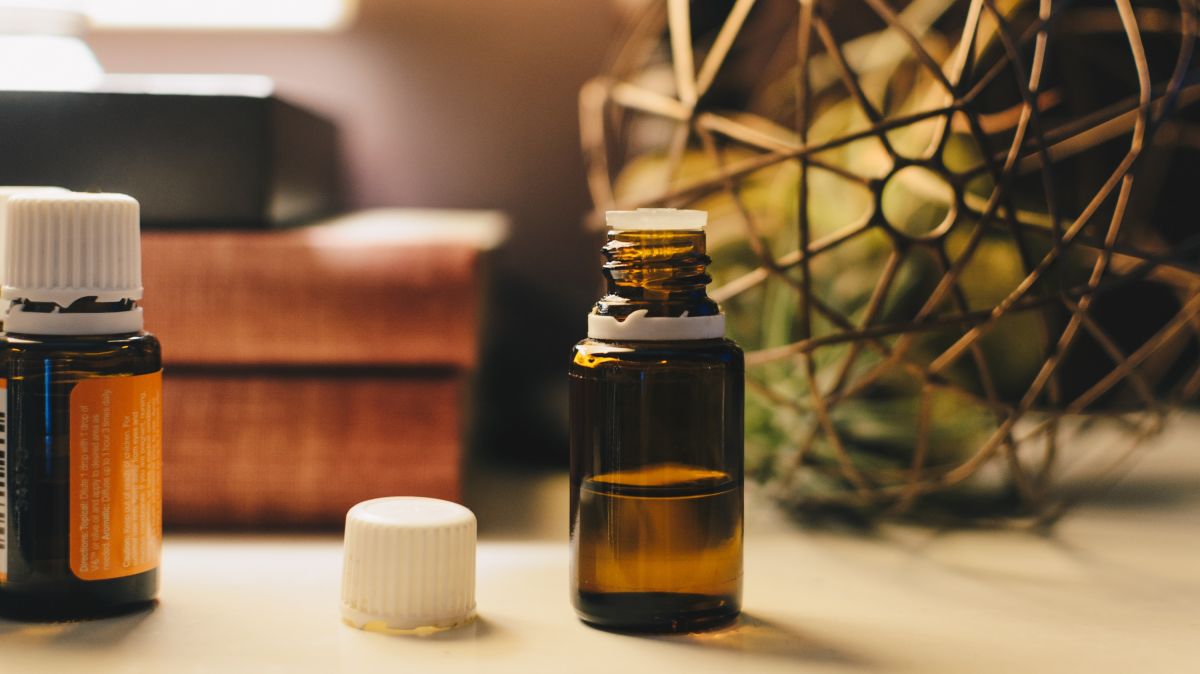Aromatherapy

A drop or two of a pure essential oil on a cotton ball (or other method) can be very effective in combating and getting through brief nausea waves, especially when coupled with controlled breathing.
Overall, evidence regarding the effectiveness of aromatherapy on Nausea and Vomiting of Pregnancy (NVP) symptoms is limited and inconsistent; however, women have various preferences for different scents which may contribute to different findings.
Further, this method may be very effective for women who are especially triggered by malodors; a quick whiff of a pleasant aroma may be enough to help women breathe through even a single wave of nausea, thereby potentially preventing a vomiting episode.
Controlled breathing may even have a more powerful effect than the scent itself, as women often take slow deep breaths when trying to smell the scent. This act may be far more effective by allowing the woman to be more aware of her breathing; it may also serve as effective distraction.
Although not specifically studied during pregnancy, the inhaled use of essential oils is safe in limited amounts (1 to 2 drops) and time of exposure (15 to 30 minutes); it is advised that women take breaks if using a diffuser, keep oils away from small children, and use them in a well-ventilated area.
Note: This evaluation is based on inhalation, rather than topical application on the skin or oral ingestion. Further, based on low cost and a lack of adverse side effects, this page includes research regarding aromatherapy and post-operative nausea and vomiting, which be of utility for pregnant women.
Essential oils should not be ingested at any time during pregnancy.
Background
Aromatherapy is a method in which concentrated essential oils are inhaled via various methods to produce a positive/medicinal physiological affect almost immediately.
Some research indicates that olfactory stimulation (smelling) of various pleasant scents can positively affect pulse, blood pressure, skin temperature, and brain activity that when coupled with controlled breathing – results in a relative calmness.
Common uses include stress and anxiety relief as well as improved mood, depression, post-operative nausea and vomiting, and Nausea and Vomiting of Pregnancy (NVP). Although essential oils appear to be safe for inhalation when used as directed, evidence regarding effectiveness is inconclusive.

Safety
While the safety during pregnancy of inhaling essential oils for a brief amount of time (15 to 30 minutes only) is very limited, in general, the practice is associated with very minimal side effects when done properly. Further, some oils are low in cost and can be very pleasant and effective for some women.
Essential oils currently available for medicinal use are “generally recognized as safe” by the United States Food and Drug Administration (FDA), but are not regulated by the FDA. However, if ingested/inhaled in large amounts, essential oils can cause physical reactions (including the skin), which can, in rare instances, be lethal.
Women should never ingest essential oils during pregnancy; this has not been studied in human pregnancy and women who wish to do this should speak with their HCP.
Women should avoid inhaling essential oils or a variety of different scents for a long period of time without a break. Although irritation can occur, some individuals susceptible to bronchospasms (i.e. asthmatics) may have more serious reactions.

Further, diffusion in small rooms or with small children can cause agitation/irritation.
Pregnant women using aromatherapy for NVP may find better effectiveness/safety in applying the scent lightly to a cotton ball or tissue and bringing it up to the nose. Some women may only need a quick whiff of a scent to fight off a nausea or a vomiting wave.
Specific Scents
Numerous studies have been conducted on the evaluation of various scents to aid in the relief of post-operative nausea (due to anesthesia). Although the nausea pathways may be different, it is possible these results can be extrapolated to NVP, especially since aromatherapy is not known to be harmful.
Essential oils can be inhaled using a diffuser or by soaking gauze or a cotton ball in a drop or two of oil and placing it a few inches away from the nose.
The most recommended scents for nausea relief appear to be peppermint, lemon, lavender, coconut, banana, chamomile, and cloves.
Lemon essential oil is one of the most widely used herbal oils in pregnancy and is thought to have antiemetic (anti-nausea) properties. One or two drops of lemon essential oil in a diffuser or on a cotton ball may help soothe and relieve NVP. In one review, 40% of women used lemon scent to relieve nausea and vomiting, and 26.5% of them reported it as an effective way to control their symptoms.
The effectiveness of peppermint is conflicting; while it has been shown to reduce nausea after surgery, studies evaluating its use in NVP have not yet found it to be very effective. Favorable scents are also very subjective, and women may vary regarding which scents they find most useful based on personal preference.
Studies have indicated ginger and lavender essential oils were superior to rose oil and pure water regarding post-operative nausea/vomiting. Two studies corroborated the effectiveness of ginger oil, as well as a blend of spearmint, peppermint, and cardamom.
Although not studied during pregnancy or for NVP, several studies found that isopropyl alcohol can improve post-operative nausea and vomiting. Sniffing this scent using one-time use isopropyl alcohol pads may provide short-term relief through nausea waves (adverse effects were not evaluated).
Interestingly, at least two studies noted that it may not be the specific scent per se that has beneficial effects, but possibly the controlled breathing pattern used to smell the aroma.
Action
Women who are interested in using various forms of inhaled aromatherapy to combat nausea or vomiting during pregnancy should speak to their HCP first. Further, women should purchase essential oils from reputable manufacturers and use them as directed, simply to smell their aroma – never to orally ingest. Women should also consider purchasing oils in their simplest form (i.e. one scent).
Although not specifically studied during pregnancy, the inhaled use of essential oils is safe in limited amounts (1 to 2 drops) and time of exposure (15 to 30 minutes); it is advised that women take breaks if using a diffuser, keep oils away from small children, and use them in a well-ventilated area.
Women can also wear a light scarf, fabric, or necklace that has been scented; they can easily bring the item closer to their face and nose whenever needed. This may make the method of using aromatherapy less obvious while around coworkers.

Women should embrace any appropriate, pleasant aroma that remotely makes them feel better – even if it is just a minute. Women could also light candles around the house they find enjoyable (safely). Women should keep in mind that they may fall asleep or become distracted by their symptoms; they should make sure they can blow out candles when necessary and unplug diffusers after use.
Women should also consider purchasing small votive candles they can hold and smell without lighting.
Women can also find a lotion with a scent they love and use if often on their hands. Further, right before bed, women can try a lavender lotion on their hands and arms, lie down on their sides with their hands near their face, and use slow, controlled breaths to help them fall asleep.
A small bowl of cut citrus (lemons, limes, grapefruit, orange) can also have the same effect as essential oil. Women can place these fruit slices in a small mug/cup and bring it close to their nose when fighting through nausea.
Women should also consider sharing their NVP experience below, especially if their experience included using aromatherapy for their symptoms, whether this strategy worked, and what scents they used.
Partner/Support
Partners/Support can help women safely light candles, keep rooms well ventilated, purchase safe essential oils, and keep small children out of small rooms with diffusers. This safety can be extended to making sure the candles are eventually blown out, and diffusers are unplugged, especially if the woman falls sleep.
Further, partners can also help keep malodors away from the pregnant woman, especially if she is easily triggered by intense odors.
Resources
Treatments for hyperemesis gravidarum and nausea and vomiting in pregnancy: a systematic review and economic assessment: Aromatherapy (Health Technology Assessment/U.K. National Health Service; 2016)
Aromatherapy for treating postoperative nausea and vomiting (Cochrane; March 2018)
Aromatherapy (U.S. National Center for Complementary and Integrative Health)